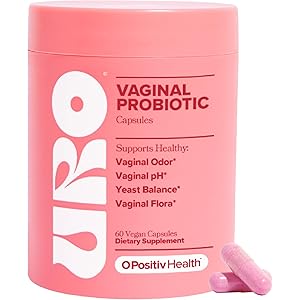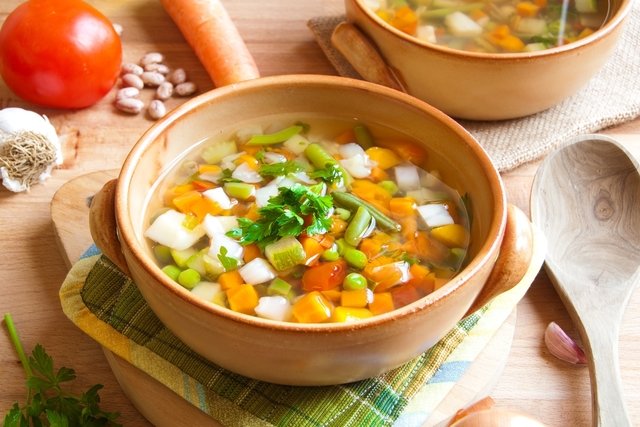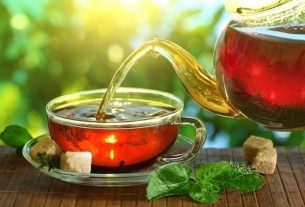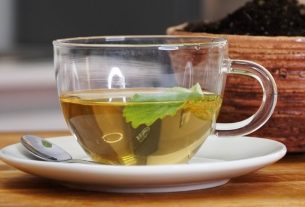During stomach pain, it is recommended to prefer easily digestible foods, such as cooked vegetables, cooked fruits and soups. Furthermore, some home remedies, such as raw potato juice, chamomile and boldo tea, are also good natural options, as they have a calming effect that helps relieve stomach pain.
However, foods such as raw vegetables, milk or dairy products with a high fat content, alcoholic beverages, fried foods in general and processed foods should be avoided because they irritate the stomach and are more difficult to digest.
Stomach pain can be caused by situations such as gastritis, reflux, anxiety and stomach cancer. Therefore, if this pain lasts for many days, it is recommended to consult a gastroenterologist to evaluate the possible causes and treat the pain individually. Know all the causes of stomach pain.
Recommended foods
Foods recommended for stomach pain should be easy to digest, low in fat and low in fiber, because fiber stays in the stomach for a long time to be digested, which can worsen the pain. Therefore, the foods recommended for stomach pain are:
- Fruits, such as papaya, apple, pear, melon, banana and guava, preferably peeled and cooked, or mashed;
- Vegetables and vegetables, such as zucchini, eggplant, carrots, spinach, spinach and pumpkin, well cooked, or in puree form;
- Low-fat proteins, such as chicken, turkey, tofu and fish, preferably grilled, roasted or stewed;
- Low-fat dairy products, such as low-fat yogurt, skimmed milk and white cheeses;
- Vegetable drinks, such as oat, rice and soy milk;
- Cereals with little fiber, such as white rice, white pasta and white bread;
- Tubers, such as potatoes, cassava, sweet potatoes and yams, peeled and cooked, or in puree form;
- Caffeine-free drinks, such as water and coconut water;
- Extra virgin olive oil, in small quantities;
- Natural seasonings, such as basil, garlic, onion, parsley, coriander and marjoram.
In addition to food, chamomile, espinheira-santa and licorice tea, and raw potato juice are also great home remedy options to relieve stomach pain. See how to use home remedies to relieve stomach pain.
Acidic fruits, such as orange, lemon, passion fruit and acerola, can worsen stomach pain in some people. Therefore, in these cases, you should avoid consuming these foods.
What to eat after a pain attack
After a stomachache crisis, it is important to gradually return to a healthy and varied diet, thus avoiding a deficiency of important nutrients for the body, such as fiber, vitamins and minerals. To do this, it is recommended to include foods such as:
- All the fruits, such as grapes, apples, oranges, strawberries, tangerines, bananas and mangoes, raw and with the peel (when applicable);
- Raw and cooked vegetables, such as lettuce, tomatoes, broccoli, cauliflower and garlic;
- Whole grainssuch as brown rice and whole wheat pasta;
- Legumes, such as beans, chickpeas and lentils;
- Whole milk and dairy productssuch as milk, yogurt and cheese;
- healthy fats, such as chestnuts, pumpkin seeds and linseed oil;
- proteins, such as beef, chicken, fish and eggs.
Additionally, caffeinated drinks and foods such as coffee, dark chocolate, and green tea can also be consumed in moderation to prevent stomach pain from reoccurring.
Diet menu for stomach pain
The following menu contains a suggested 3-day diet for stomach pain:
The foods indicated on the menu may vary according to each person’s tolerance and health status. Therefore, it is advisable to consult a nutritionist so that a complete assessment can be carried out and a diet suited to individual needs can be created.
Stomach pain can reduce your appetite, however, it is important to eat small meals, dividing them every 3 hours, for example. This is because going too long without eating can cause an increase in the production of acid in the stomach, making the pain worse.
Foods that should be avoided
Foods that should not be consumed are those that take a long time to digest and that can irritate the stomach, such as:
- Processed meats, such as sausage, bacon, ham, salami and mortadella;
- Dairy products with a lot of fat, such as whole milk, full-fat yogurt, cheddar cheese, mozzarella and cheese;
- Ready-made sauces, such as ketchup, soy sauce, mustard and mayonnaise;
- Greasy food, such as fried foods, packaged snacks, frozen lasagna, pizza snacks, hamburgers and hot dogs;
- Coffee or teas with caffeine, such as green tea, chimarrão, mate tea or black tea;
- condiments, such as pepper, curry, chilli and paprika;
- Industrialized drinks, such as soft drinks, teas and boxed or bottled juices;
- Alcoholic beverages, such as beer, wine and sparkling wine;
- Sweets in general, such as ice cream, cake, pudding, jam sweets and stuffed biscuits.
Furthermore, acidic fruits such as lemon, orange, acerola and pineapple can also cause stomach irritation in some people and, therefore, in this case, they should be avoided.
Foods such as cauliflower, broccoli, beans, chickpeas and lentils should also be avoided, as they can increase gas production, causing stomach pain.
Bibliography
- CLEVELAND CLINIC ABY DHABI. An overview of a diet well-tolerated by the stomach and intestines. Disponível em: <https://www.clevelandclinicabudhabi.ae/en/health-hub/health-library/pages/an-overview-of-a-diet-well-tolerated-by-the-stomach-and-intestines.aspx>. Acesso em 19 mai 2022
- MAGAZINE OF THE BRAZILIAN MEDICAL ASSOCIATION. Gastroesophageal reflux disease: non-pharmacological treatment. 2012. Available at: <https://www.scielo.br/j/ramb/a/H5rHmySgjghkZ7HWMwjc3nd/?format=pdf&lang=pt>. Accessed on May 19, 2022
- INTERNATIONAL FOUNDATION FOR GASTROINTESTINAL DISORDERS. Diet and lifestyle changes: diet changes for GERD (gastroesophageal reflux disease). Disponível em: <https://aboutgerd.org/treatment/diet-lifestyle-changes/diet-changes-for-gerd/>. Acesso em 19 mai 2022





